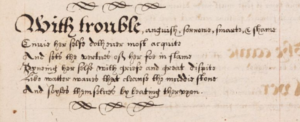
ANU CEMS is delighted to welcome Professor Michelle O’Callaghan from the University of Reading for the next CEMS seminar, “Making Poetry Collections by Hand and Productive Leisure.”
This seminar can be attended in-person and online.
Time: 3 September, 2024 at 6pm AEST (UTC +10)
Venue: Auditorium, RSSS Building (146), Ellery Crescent, ANU
Making Poetry Collections by Hand and Productive Leisure
What can a focus on the work of the hand bring to the study of making poetry collections in early modern scribal cultures? Compiling poetry collections by hand depended on manual labour that required technical skills, was time-consuming, often intensive, and, in this sense, was work-like. In the case of those manuscripts compiled by the user, it was also work that was undertaken by choice, during leisure time, and, at some level, was satisfying. I am interested in how the category of productive leisure, which turns attention to the pleasurable work of the hand, can help to understand the kinds of making practised in scribal cultures in early modern England. The examples I will discuss were produced by scribes, working outside scriptoria and elite households, for whom penmanship was both work and recreation, and who make literary cultures beyond early modern London and the universities visible.
About the Speaker
Michelle O’Callaghan is Professor of Early Modern Literature at the University of Reading. She has published extensively on early modern literature and culture, from the Inns of Court and tavern societies to women’s engagement in literary cultures. Her major books are The ‘shepheards nation’: Jacobean Spenserians and early Stuart political culture, 1612-1625 (Oxford, 2000), The English Wits: Literature and Sociability in Early Modern England (Cambridge, 2007), Thomas Middleton, Renaissance Dramatist (Edinburgh, 2009), and Crafting Poetry Anthologies in Renaissance England: Early Modern Cultures of Recreation (Cambridge, 2020). She is currently co-writing a monograph with Rosalind Smith and Sarah Ross, Early Modern Women and the Poetry of Complaint.